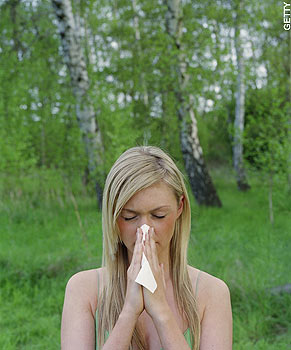Millions of allergy sufferers await the pollen assault of Spring with fear and resignation. When their eyes water and their noses run, they may feel like there is nothing that they can do but stock up on tissues. However, a study by Dr. Kiecolt-Glaser, presented at this year’s annual meeting of the American Psychological Association, suggests that reducing stress may be a concrete way to lessen the impact of allergies.
Dr. Kiecolt-Glaser gathered 28 subjects with histories of seasonal allergies like hay fever. They were all tested at baseline and then exposed to two different tasks meant to provoke moderate and high levels of stress. The moderate stress situation just involved being taped while reading from a magazine. The much more frightening situation had subjects deliver a ten-minute speech in front of a panel of judges. Saliva samples confirmed that higher level of stress hormones were generated.
Subjects were pricked by a needle with a variety of allergens on the tip, producing a harmless skin abrasion called a “wheal”. Compared to reactions before any experimentation, wheals were 75% larger after the moderate stress exposure and approximately 100% larger after the high-stress situation. Even more fascinating, this exacerbated allergic reaction continued over to the next day. This could have practical implications for medications, which are currently aimed at treating only that day’s symptoms.
Previous studies have shown that stress can negatively impact the immune system, and this experiment establishes that stress can make people more vulnerable to excessive immune reactions. Relaxation techniques may keep your allergies much more manageable.
